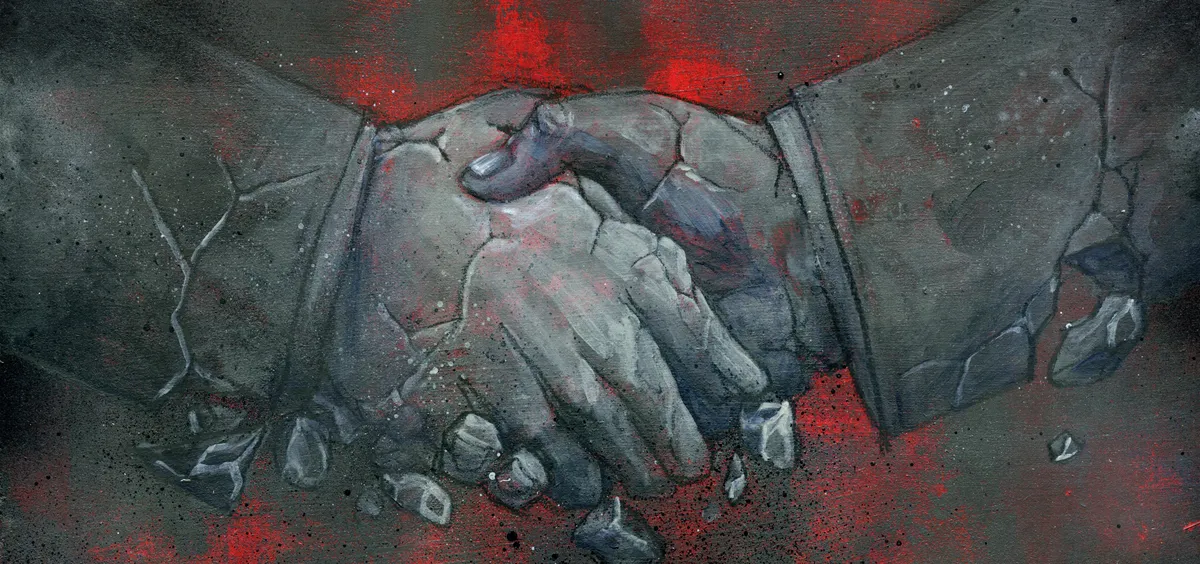Phrases for betrayal, treason, and that one backstabbing friend
Choice Chengyu is a regular column, examining interesting, unique or newsworthy examples of chengyu—four-character idioms or proverbs, derived from historical and mythical events.
On May 25, 1644, ex-Ming general Wu Sangui surrendered to the Manchu army, opening the gate at Shanhai Pass to allow his former enemies inside the Great Wall. This was believed to be the decisive move that allowed the Manchus to conquer the capital and establish the Qing dynasty.
One of the most controversial turncoats in Chinese history, Wu later backstabbed his new masters, instigating an eight-year rebellion to overthrow the Qing in 1673. Treachery, though, is nothing new in history, and there are as many chengyu for gratitude as for betrayal. On the 375th anniversary of Wu’s infamous double-cross, why not learn a few?
忘恩负义 Forget favors and betray a friendship
One of the most widely used terms for an ingrate, this phrase is often heard in TV dramas:
你这个忘恩负义的无耻小人!
Nǐ zhège wàng’ēn-fùyì de wúchǐ xiǎorén!
You are such shameless, ungrateful scum!
背信弃义 Betray trust and renege on a commitment
This phrase focuses on a breach of trust, rather than failure to pay back a favor, and is most often applied to a former friend or ally:
我没想到他竟然这么背信弃义。
Wǒ méi xiǎngdào tā jìngrán zhème bèixìn-qìyì.
I didn’t expect he’d betray our trust like this.
吃里扒外 Eat one side’s food and cater to the other
This is a colloquial expression, referring to those who obtain favors from one party while secretly serving an opponent. For example:
There are double-dealers within our company who sell information to our rivals.
Wǒmen gōngsī yǒu rén chīlǐ-páwài, bǎ xìnxī mài gěi duìshǒu.
我们公司里有人吃里扒外,把信息卖给对手。
见利忘义 Forget what’s right at the sight of profit
This idiom comes from the Book of Han. After the death of the first Han emperor, Liu Bang, the family of his wife, Empress Lü, plotted a coup and installed her nephew, Lü Lu, as a general of the Han military. When Empress Dowager Lü died in 180 BCE, details of the plot came to light. Officials loyal to the emperor’s family persuaded Lü Lu’s close friend, Li Ji, to use a forged imperial edict to trick Lü Lu, leading to the defeat and massacre of the entire remaining Lü family. Li later received a promotion for his part in the conspiracy.
Although historians reviled Empress Lü and her family as cruel and illegitimate rulers, they also condemned Li for his role in unseating them, because it involved betraying his friend. Even the author of the Book of Han acknowledged this, saying: “It’s called betrayal if one forgets what is right at the sight of profit…although Li did it for the good of the country.”
He never sacrifices principles for profit; there must have a good explanation for what he did.
Tā búshì yí gè jiànlì-wàngyì de rén, tā zhème zuò yídìng shì yǒu lǐyóu de.
他不是一个见利忘义的人,他这么做一定是有理由的。
过河拆桥 Dismantle the bridge after crossing the river
During the Yuan dynasty, a high official named Xu Youwang strongly opposed the Emperor Shun’s plan to abolish the tradition of imperial examinations. But the emperor didn’t listen, and instead humiliated Xu by ordering him to head-up the line of officials who came to hear the edict in court. Later, another official, Pu Hua, mocked Xu as being “among those who demolish the bridge after crossing the river,” implying that he had pulled up the ladder behind him after obtaining his own success. Though this accusation was obviously unfair, the expression was passed down:
Now they have got what they want, they’ll kick me out without the least scruple!
Xiànzài tāmen de mùdì dádào le, jiù yào guòhé-chāiqiáo, bǎ wǒ yì jiǎo tīkāi!
现在他们目的达到了,就要过河拆桥,把我一脚踢开!
众叛亲离 Opposed by the public and deserted by one’s followers
Betrayal is usually considered a bad thing, but ancient historians also believed that a person betrayed by multiple followers must have done something to deserve it.
During the Spring and Autumn period, Prince Zhou Yu of the State of Wei killed his own brother and claimed the throne. According to the Zuo Zhuan, his countrymen were outraged by this fratricide. In order to divert attention, Zhou Yu decided to launch a war, in alliance with the Song, Chen, and Cai states, against the State of Zheng.
The king of the State of Lu asked his advisers whether Zhou Yu would succeed. As one replied, “Zhou Yu did cruel things without remorse. He will be opposed by the public and deserted by his followers.” Before long, Zhou was indeed assassinated by a subordinate.
He acts so unreasonably, that sooner or later he will be opposed by everyone!
Tā zhème dàoxíng nìshī, chízǎo yào zhòngpàn-qīnlí!
他这么倒行逆施,迟早要众叛亲离!
Cover image from VCG














